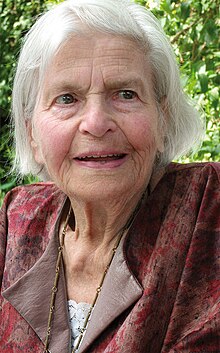Ingeborg Hunzinger
You can help expand this article with text translated from the corresponding article in German. (September 2017) Click [show] for important translation instructions.
|
Ingeborg Hunzinger | |
|---|---|
 | |
| Born | Ingeborg Franck 3 February 1915 Berlin, Germany |
| Died | 19 July 2009 (aged 94) Berlin, Germany |
| Known for | Sculpture |
| Spouse(s) | Adolf Hunzinger (1949–? (div); Robert Riehl (1960s–1976, his death) |
| Partner | Helmut Ruhmer (1939–1945) |


Ingeborg Hunzinger (3 February 1915, in Berlin – 19 July 2009, in Berlin) was a German sculptor.
Life and career
Hunzinger was born Ingeborg Franck to a Jewish mother. In 1932 Ingeborg joined the Communist Party. She was an apprentice stone mason in Würzburg from 1936 until 1938. She was then pupil of Ludwig Kasper for the duration of 1938/39[1] When the Nazis prevented her continued education and teaching in 1939, she emigrated to Italy. There, she met the German painter Helmut Ruhmer. In 1942, they returned to the Black Forest, Germany, and had two children. However, because of Ingeborg's part-Jewish ancestry, they were not allowed to marry within the country.
Ruhmer was killed in the last year of World War II and Ingeborg married Adolf Hunzinger in the mid-fifties, with whom she had her third child. After a divorce from Hunzinger, she married the sculptor Robert Riehl in the mid-sixties.
Hunzinger resumed her art studies in East Berlin in the early fifties; she was a master pupil of Fritz Cremer and Gustav Seitz. She taught at the Academy of Art Berlin-Weißensee and worked from 1953 as a free-lance artist. She joined later the Party of Democratic Socialism.[2]
In 1995, Hunzinger created Block der Frauen (Block of Women) on the site of the Old Synagogue where the Rosenstrasse protests took place. She created this to honour the courage of the women who fought to protect their families.[3]
Hunzinger was the grandmother of the writer Julia Franck.
Selected works
-
Die Erde, 1974
-
The Sphinx, 1975
-
Block der Frauen, 1995
-
Karl Liebknecht, 1998
-
Mathilde Jacob, 1998
-
Vater und Kind, 1958, Müggelpark
Berlin-Friedrichshagen -
Die Sinnende, 1980, Schlosspark Biesdorf
Berlin-Marzahn -
Tugenden und Laster des Sozialismus, 1966, Funkwerk
Berlin-Köpenick -
Tugenden und Laster des Sozialismus, 1966, Funkwerk
Berlin-Köpenick -
Tugenden und Laster des Sozialismus, 1966, Funkwerk
Berlin-Köpenick -
Sich Befreiender, 1991, Marzahner Promenade
Berlin-Marzahn -
Sich Aufrichtende, 1987, Marzahner Promenade
Berlin-Marzahn -
Die Geschlagene, 1985, Marzahner Promenade
Berlin-Marzahn -
Paar-Alter (Detail), 1987, Schragenfeldstraße
Berlin-Marzahn -
Der Jüngling, 1987, Schragenfeldstraße
Berlin-Marzahn -
Der Knabe, 1986, Gartencenter Fürstenwalder Allee
Berlin-Rahnsdorf -
Werden, 1987, Garten der Künstlerin
Berlin-Rahnsdorf -
Gedenken an Mathilde Jakob, 1998, Franz-Mehring-Platz
Berlin-Friedrichshain
Literature
- Christel Wollmann-Fiedler: Ingeborg Hunzinger. Die Bildhauerin. Wuppertal: HP Nacke Verlag, 2005. ISBN 3-9808059-6-4
- Rengha Rodewill: Einblicke – Künstlerische - Literarische - Politische. The sculptor Ingeborg Hunzinger. With letters from Rosa Luxemburg. Karin Kramer Verlag, Berlin 2012, ISBN 3-87956-368-3
References
- ^ bm (20 July 2009). "Bildhauerin Ingeborg Hunzinger gestorben". Die Zeit (in German).
- ^ "'Made to look silly and laughable'—the PDS in Germany reacts to the erection of a statue of Rosa Luxemburg" by Stefan Steinberg, World Socialist Web Site (27 January 1999)
- ^ "Block of Women". Visit Berlin. Berlin Tourismus & Kongress GmbH. Retrieved 20 October 2020.
External links
- "Ingeborg Hunzinger gestorben", Junge Welt (20 July 2009) (in German)
- Short biography and list & B/W photos of her works in Berlin (in German)
- "93-Jährige formt Denkmal für Rosa Luxemburg" [93-year-old forms memorial for Rosa Luxemburg] by Kathrin Hedtke, Der Tagesspiegel (15 April 2008) (in German)


















